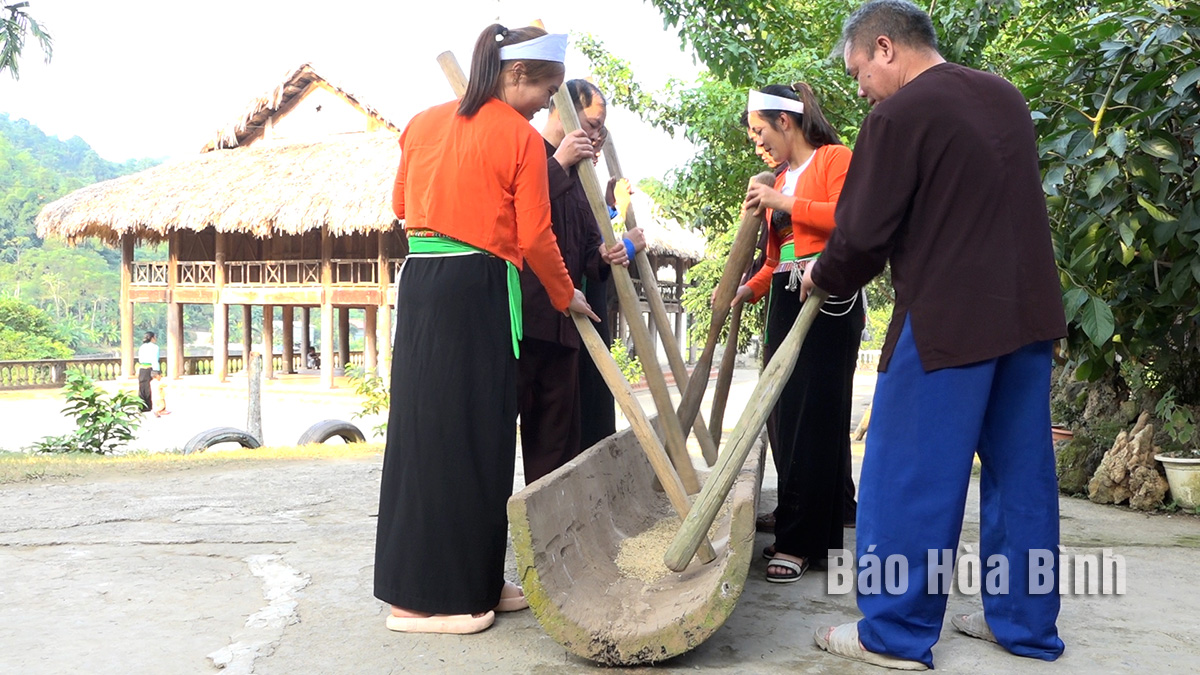
Boasting poetic and charming natural landscapes, simple stilt houses deeply imbued with the Muong ethnic cultural identity, distinctive customs and lifestyle, and rich cuisine, Mo hamlet in Binh Thanh commune of Cao Phong district holds favourable conditions to develop community-based tourism.
The "dam duong” (rice pounding) custom of Muong people
has been revived and reenacted by members of the community-based tourism
cooperative of Mo hamlet, Binh Thanh commune (Cao Phong district), to serve
visitors.
Dinh Van Lan, Vice Chairman of the Binh Thanh
communal People’s Committee, said that one of the important projects
substantially supporting the preservation and promotion of ethnic minority
groups’ traditional culture is the one on upholding and bringing into play the
minorities’ fine traditional cultural values in tandem with developing tourism.
This project, chaired by the Ministry of Culture, Sports and Tourism (MCST), is
part of the national target programme on socio-economic development in ethnic
minority and mountainous areas for the 2021 - 2025 period. To carry out the
project, the Hanoi Tourism College has implemented a Muong ethnic culture
experiencing and introducing model in Binh Thanh.
The initial success of this project is a good
start for Mo hamlet to regain its good reputation, he said, noting that his
commune hopes for the project’s continued assistance in preserving cultural
values of the Muong people so as to uphold cultural characteristics and develop
tourism, thereby contributing to local socio-economic development.
Mo hamlet is home to 195 households with 767
residents. Its community-based tourism cooperative was established in 2021 with
30 members. The cooperative now has two clubs working rather effectively,
namely the club for collecting and introducing Muong people’s traditional
culture and the one for teaching Muong folk songs and dances. Since its
inception, the cooperative has served 36,218 tourists, 93.1% of them Vietnames.
Dinh Van Dan, Director of the cooperative, said
they have been recovering tangible and intangible cultural heritage elements of
the Muong people such as looms, watering wheels, the practice of walking on
stilts, the game of "con” (cloth ball) throwing, "Mo Muong”, "Doi” calendar,
gong melodies, and folk songs, so as to design new programmes for visitors to
experience the rich Muong culture.
Besides, forming a cultural village in
association with tourism promotion is not a new method but will help preserve
and bring into play the cultural identities of ethnic groups, eliminate
backward customs and social vices from the community, and encourage the
adoption of a civilised and healthy lifestyle deeply imbued with local cultural
characteristics to attract tourists coming to explore.
Hoang Anh Hau, Director of the Centre for
Continuing Training at the Hanoi Tourism College, said in the time ahead, the
school will continue proposing the MCST open more tourism training courses for
local residents to help the quality of the community-based tourism site in Mo
hamlet be equivalent to or higher than others’ in Hoa Binh province.
Community-based tourism is a type of tourism
generating many benefits in terms of sustainable economic development for
locals. It helps people to not only protect the environment but also preserve
and bring into play unique cultural values of their localities, he added.
Located just a 20-minute drive from Hoa Binh City, Ora Hill Farmstay & Glamping Hoa Binh is a captivating new destination nestled in Mo hamlet, Bình Thanh commune, Cao Phong district. Combining farming with leisure, this tranquil retreat is perfect for those seeking balance, joy, and an immersive experience in the expansive beauty of nature.
Muong Bi - Tan Lac is renowned as one of the four famous Muong regions in Hoa Binh province. Blessed by nature with a favourable climate and stunning landscapes, Tan Lac holds great advantages for tourism development. The local tourism industry has made remarkable strides in recent times thanks to the attention and support from the local authorities and sectors.
With its strategic location, well-developed transport network, and diverse soil and climatic conditions, Hoa Binh is emerging as a must-visit destination in Vietnam's northwestern tourism corridor. The province boasts numerous attractions, including the Kim Boi hot springs (Kim Boi district), the Dau Rong cave complex (Cao Phong), the Mai Chau valley (Mai Chau), and the iconic Hoa Binh hydropower plant.
The northern mountainous province of Hoa Binh has been listed among the 71 most beautiful places to visit worldwide by the prestigious US travel magazine Condé Nast Traveller.
Hoa Binh province’s rich natural and cultural resources position it as a prime location for developing community-based tourism (CBT). In recent years, support from central and provincial policies, as well as assistance from non-governmental organisations, have encouraged local ethnic minority and mountainous communities to actively engage in the sector.



